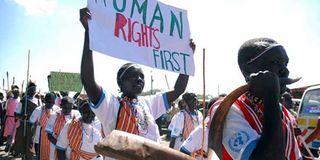Rid Kenya of inhumane, colonial laws

Although Kenya is not a post-conflict nation, it can borrow a lot from the “Model Codes for Post-Conflict Criminal Justice”, a simple and clear document designed to enable countries from conflict to move towards re-establishment of the rule of law and fair criminal justice. PHOTO | FILE | NATION MEDIA GROUP
What you need to know:
- The UDHR was adopted by the UN General Assembly in 1948 as a common standard of achievements for all peoples and all nations.
- The Penal Code style of communication is uncouth.
- The laws refer to people with mental distress as lunatics and/or imbeciles.
December 10 was the 70th anniversary of the Universal Declaration of Human Rights (UDHR).
Coincidentally, Jamhuri Day, Kenya’s independence day, was celebrated on December 12, two days after the annual International Human Rights Day, whose theme was “Stand up for human rights”.
The UDHR was adopted by the UN General Assembly in 1948 as a common standard of achievements for all peoples and all nations.
The document set out for the first time fundamental human rights to be universally protected.
REVISIT INHUMANE LAWS
As we celebrate the three key occasions, Kenyans should revisit both inhumane and colonial laws that do not reflect the spirit and intention of the designers of the UDHR and our independence heroes.
Although Kenya has shown commitment to its international human rights obligation, it still has laws that violate human rights.
Fifty-five years later, it holds onto inhumane colonial laws.
Despite making huge strides towards socio-economic and political independence, it seems not to have done so in developing laws that conform to a modern nation.
These laws do not serve any purpose in a post-colonial Kenya and their existence is just an element of neo-colonialism and breach of human rights.
Most of them are contained in the Penal Code, which is traced to India. It was introduced in Kenya in 1930 during the struggle for independence as a mechanism to criminalise the African uprising.
One such law is the death penalty. It goes without saying that execution of a human being is an inhumane punishment, whatever the circumstances.
According to the UDHR, everybody has the right to life and to live free from torture.
Since 1987, there has been no death row convict has been executed in Kenya, eliciting the question: “Why not abolish the death penalty?”
VIOLATES VALUES
The significance of human rights is precisely that some means may never be used to protect society because their use violates the very values which make society worth protecting.
Although the court, in some instances, has said that the death penalty is not a cruel, inhuman, degrading treatment or punishment, I differ and submit that this is a misreading of Article 26 of the Constitution.
The second offensive law is criminalisation of consensual same-sex adult relationships sanctioned by Section 162 of the Penal Code.
Ironically, we continue holding onto this law to protect our African morals yet it wasn’t introduced in our books by Africans.
This law has been an impediment to attainment of health rights by a section of our community. It has also been used to extort, persecute and discriminate against sexual and gender minority (or, maybe, majority) in Kenya.
Unfortunately, we cling on a law that, in itself, promotes commission or omission of other offences — such as rape, cyber bullying, denial of medical attention and assault.
BRITISH DID AWAY WITH LAW
Even more ironical, the British, whose colonial government gave us this law, did away with it in 1967!
Loitering with intent to commit a crime or with intent to engage in prostitution is another absurd crime that keeps our courts busy on Mondays and hugely contributes to police harassment and bribery. It was meant to protect the colonial government offices and residences and contain freedom fighters in concentration camps and also bar them from accessing the city.
Today, the Constitution allows for freedom of movement and association.
Also, a Kenyan will be worried for not carrying his or her identification card. We have been “programmed” to believe that walking without an ID is an offence; it is not!
This concept, used by some police officers to harass their fellow citizens, is founded on the famous Kipande system used by the colonial master to alienate Africans from their fertile highland lands and contain them in the underproductive camps.
OPPRESS AFRICANS
It was also used to oppress the Africans through forced labour and keep an eye on the Kenya African Union members.
Lastly, the Penal Code style of communication is uncouth.
The laws refer to people with mental distress as lunatics and/or imbeciles.
The Act also fails to appreciate the use of non-custodial sentences as prescribed in recent policy developments.
Several sections of the Penal Code have been declared unconstitutional and inhumane. We should scrap it off our books and develop a Criminal Code that is aligned to the modern challenges and adheres to international standards of human rights.
Although Kenya is not a post-conflict nation, it can borrow a lot from the “Model Codes for Post-Conflict Criminal Justice”, a simple and clear document designed to enable countries from conflict to move towards re-establishment of the rule of law and fair criminal justice.
Mr Muthuri is the legal Aid manager at African Prisons Project. [email protected].





